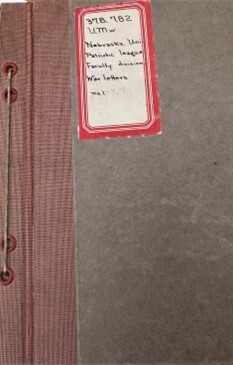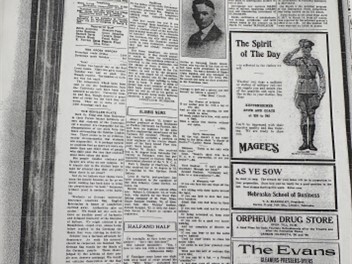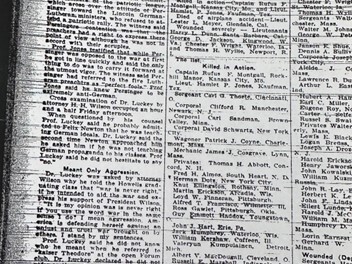Anti-German Sentiment and the Professor's Trial at Nebraska University
Cameron Garbett, HIST 250: Historian’s Craft, Spring 2024
Introduction
“Any man who carries a hyphen about with him,” U. S. President Woodrow Wilson declared as he was critiquing the identity of the “German-American” in a speech shortly after the Great War in 1919, “carries a dagger that he is ready to plunge into the vitals of this Republic when he gets ready.”[1] Wilson’s quote demonstrates the extent to which anti-German sentiment had spread in the United States after the nation’s entry into what would become known as World War I (WWI). Despite Nebraska being far from the center of the war, the spread of anti-German sentiment in Nebraska changed the way German Americans as well as the students and faculty of the University of Nebraska (also known as Nebraska University and later to become the University of Nebraska-Lincoln) conducted their lives during the war.
An analysis of German immigration to the United States and their spread throughout Nebraska in the years and decades before 1917 provides context for how and why anti-German sentiment spread in the United States and how that affected students and faculty at Nebraska University. This background includes the development of German American culture and politics and how, after the United States joined the war, the spread of anti-German sentiment reached its zenith. The so-called Professors’ Trial of 1918 threatened professors and staff at Nebraska University with censure, loss of career, and even prison sentences due to perceived lack of patriotism and support for the U.S.’s entry into the war. It also reveals the tangible effects of anti-German sentiment within the University in particular.
Immigration
Starting in the nineteenth century, German immigration to the United States boomed. By 1800, German immigrants began coming in larger numbers due to increased unemployment, British competition in the market, and repercussions for the failed 1848 revolution in Germany. Those who settled in the United States began writing letters back to family encouraging friends and family to come as well, by describing the economic opportunities available to them in the United States. Out of a population of 2,732 persons, the Nebraska territory contained seventeen heads of families born in Germany by 1854.[2]
In the late 1800s, steam ships started replacing sailboats for trans-Atlantic immigration and became more widely accessible to everyone. As a result, more than five million people were able to immigrate from Germany. The United States had started becoming a refuge for Germans fleeing persecution and antisemitic violence. The United States also played a role in encouraging German immigration. With the signing of the Homestead Act in 1862, there was a big influx of people moving west across the Great Plains. Among the many people drawn west were German immigrants, who were attracted to the news of free land. The promise of land gave them hope that they could make a life for themselves on the frontier and with more autonomy. According to the 1860 census, Nebraska territory’s population had risen to 28,841 white citizens, of which 1,742 were German born.[3]
Among the large amounts of land in the western United States, Nebraska was particularly attractive. Compared to other Western territories and states, Nebraska had more land available, and the land was being sold at a cheaper price (or free under the Homestead Act of 1862). In some instances, the state of Nebraska sent agents to Germany “complete with maps and other publications in German designed to entice prospective immigrants.”[4] Another factor that made Nebraska more attractive was its state taxes, which was considerably less than other Western states. This encouraged migrants of all nationalities to stake their claim to the frontier.[5]
Culture and Politics
The Germans settling in Nebraska came from many different backgrounds, some from northern Germany who were Lutheran Christians, others especially from the southern parts were Catholics, and yet others were not particularly religious. Many of them were from rural areas and “predominantly lower middle class, farmers, craftsman, and shopkeepers.”[6] Americans in Nebraska would characterize the German immigrants as “ill-suited for the rigors of frontier life and were addicted to the amenities of civilization.”[7] Yet, this was largely not true. German immigrants moved onto land previously inhabited by Native Americans and perhaps other European settlers “to improve it, using superior farming, methods, and a stubborn, unyielding determination, to succeed.”[8] German immigrants showed a lot of persistence and due to their cultural beliefs, they were able to overcome the hardships of the frontier, especially when it came to the pressures of American society and land ownership. In European culture, to have land was to have power and would give the individual more autonomy. For the Germans, land gave them status, improving their social and economic standing. By having this land, you could employ day-laborers to work on the land, often working for little pay while the landowner made a large profit.[9]
Despite the social and economic progress that many German immigrants and their succeeding generations achieved, many also experienced cultural discrimination in the years and decades preceding WWI. Many of the cultural material and values that gave them status and self-respect in Europe no longer applied. “Instead, these things became sources of humiliation,” writes Frederick Luebke. “The clothes, their mannerisms, and his speech – all of which were manifestations of his self-image and personality” became subject to derision within normative American culture.[10]
In part as an attempt to defend their culture, some German Americans were active in politics. In addition to being heavily involved in issues of the day such as Prohibition and women’s suffrage, much of their political activity related to promoting and preserving their language and cultural practices. The National German-American Alliance was founded in 1901 to combat these perceived threats and to unify the German political voice. In 1910, Nebraska German Americans formed their own chapter of the Alliance and created social festivals and clubs to organize their political agitations. In fact, the Nebraska chapter claimed an important victory prior to WWI. With help from the University of Nebraska foreign language department, the Alliance was able to get the Mockett Law passed in 1913. This law required one period per day to be devoted to foreign language instruction if parents or guardians of at least fifty students above the fourth grade requested it.[11] By the dawning of the Great War, German Americans in Nebraska could claim a robust cultural and political presence throughout the state.
Anti-German Sentiment and World War I
In the years leading up to United States entering WWI, there had not been overwhelming support. Most of the population saw this as a European war that had no direct involvement with the United States.[12] President Woodrow Wilson changed that using extreme nationalism and scare tactics to force the public into the war. In his 1915 State of the Union address, President Woodrow Wilson stated that “there are citizens of the United States, I blush to admit, born under other flags, but welcomed under our generous naturalization laws, to the full freedom and opportunity of America, who have poured the poison of disloyalty into the very arteries of the national life…. Such creatures of passion, disloyalty, and anarchy must be crushed out.”[13] This directly targeted Americans that had emigrated from another country, specifically Germans.
Back in Nebraska the conflict between the wave of nationalism and its detractors is depicted in an April 11, 1917 article in the University newspaper The Daily Nebraskan. Entitled “Protests Against Widespread War,” the article shares that ninety-nine faculty members of the University sent a petition to President Wilson and the Nebraska congressional delegation to protest against “aggressive participation by this nation in the European wars.” The petition was a response to an earlier faculty petition which denounced “pacifism as ‘dangerous’ at such a time.”[14] The United States Congress had just voted to enter the war on April 6, 1917, and ultimately the nationalistic voices dominated public opinion nationally and statewide. The Nebraska University Patriotic League, Faculty Division was created soon after the United States joined the war and pushed radical views of citizenship and patriotism on campus. These radical views included how “there is no German-American, Americans don’t wear masks” and that you either are an American or not because there was no in between.[15]
Anti-German Sentiment and World War I
In the years leading up to United States entering WWI, there had not been overwhelming support. Most of the population saw this as a European war that had no direct involvement with the United States.[16] President Woodrow Wilson changed that using extreme nationalism and scare tactics to force the public into the war. In his 1915 State of the Union address, President Woodrow Wilson stated that “there are citizens of the United States, I blush to admit, born under other flags, but welcomed under our generous naturalization laws, to the full freedom and opportunity of America, who have poured the poison of disloyalty into the very arteries of the national life…. Such creatures of passion, disloyalty, and anarchy must be crushed out.”[17] This directly targeted Americans that had emigrated from another country, specifically Germans.
Back in Nebraska the conflict between the wave of nationalism and its detractors is depicted in an April 11, 1917 article in the University newspaper The Daily Nebraskan. Entitled “Protests Against Widespread War,” the article shares that ninety-nine faculty members of the University sent a petition to President Wilson and the Nebraska congressional delegation to protest against “aggressive participation by this nation in the European wars.” The petition was a response to an earlier faculty petition which denounced “pacifism as ‘dangerous’ at such a time.”[18] The United States Congress had just voted to enter the war on April 6, 1917, and ultimately the nationalistic voices dominated public opinion nationally and statewide. The Nebraska University Patriotic League, Faculty Division was created soon after the United States joined the war and pushed radical views of citizenship and patriotism on campus. These radical views included how “there is no German-American, Americans don’t wear masks” and that you either are an American or not because there was no in between.[19]
The Professors’ Trial of 1918
Such was the political climate within Nebraska and on campus which enabled a unique attack upon free speech and German-Americans in particular. Over 6,000 Americans were sentenced to prison terms during WWI for being “critical of the president, the administration, the war, the armed forces, or at times even the Red Cross.”[20] This sweeping attack upon First Amendment rights included University of Nebraska targets, culminating in the so-called Professors’ Trial of 1918. On May 28, 1918, eleven professors and one staff member were put on trial for disloyalty. The Nebraska State Council of Defense pressured the Board of Regents to charge these University employees, led by Councilmember and editor of the Omaha Nebraskan, Richard L. Metcalfe. Metcalfe developed a clear bias against the German American population in Nebraska and even went as far as blaming them for his defeat in a 1914 run for governor.[21]
Shortly after the U.S. Declaration of War was signed in April 1917, Metcalfe was appointed to the Secret Service Committee of the State Council. Originally designed to help each state coordinate war efforts, the State Council of Defense in Nebraska immediately saw other ways to help coordinate and advance the war effort. Metcalfe wrote a report that highlighted the disloyalty in Nebraska, identifying the main culprits as “the German-American population” and “the State University of Nebraska.”[22] The report stated that “several professors of the state university have so persistently given encouragement, publicly and privately, to those who are out of harmony with the American cause” that “the Nebraska State council of defense intends, to employ its power and authority to the limit in the effort to suppressed in Nebraska any interference with the determination to push the war to a speedy and successful conclusion.”[23] This same rhetoric echoes from totalitarian governments, making it clear that if anything or anyone is not one hundred percent American then the Counsel will come after you.
Taking place in the law building on campus, the Professors’ Trial was a fight between First Amendment rights and allegations of disloyalty. The Regents opted for a public trial where “anyone could bring any charge against any university employee.”[24] This extraordinary situation led to four more professors being charged for disloyalty, totaling sixteen university employees. The defense argued that freedom of speech and academic freedom allows them to teach German culture and language as well as be critical of U.S. policy. The prosecution portrayed the defendants as subversive, because the professors were undermining the war effort with their criticisms. Each defendant ended up being tried separately based on their specific allegations. By the end of the trials, Agronomy Professor Erwin P. Hopt was fired for being a pacifist, and two other professors were fired not for disloyalty, but because the Regents determined “they were no longer useful to the university.”[25] To this day, the University of Nebraska holds, in the words of Frank Edler, “the dubious distinction of being the only university in the United States” to have put so many of its own faculty and staff on trial for exercising their freedoms of speech and academics.[26] Overall, this trial brought to light the extreme views of nationalism and Americanism that ran through the government during WWI.
Conclusion
The culmination of anti-German sentiment in the United States before and during World War 1 had dramatic repercussions, even places far from the front lines such as Nebraska. President Wilsons’s inciting words about hyphenated Americans inflamed an already contentious atmosphere, and many began labeling German Americans as political threats to the nation. The University of Nebraska became a battleground between unquestioning patriotism and freedoms promised to American citizens. The Professors’ Trial of 1918 embodied the essence of this period as professors and staff were accused of being disloyal to the United States just because they taught German or had different feelings about the war. The climate of fear stretched into every aspect of life, from school to everyday interactions, leaving a significant impact on the German American community in Nebraska as well as the University of Nebraska.
Notes
- “Woodrow Wilson, ‘The Pueblo Speech’ (25 September 1919),” Voices of Democracy, The U.S. Oratory Project, accessed April 11, 2024, https://voicesofdemocracy.umd.edu/wilson-the-pueblo-speech-speech-text/.
- Frederick C. Luebke, Immigrants and Politics: The Germans of Nebraska, 1880-1900 (Lincoln: University of Nebraska Press, 1969), 16.
- Luebke, Immigrants and Politics, 17.
- Don Heinrich Tolzmann, The German-American Experience (Amherst, New York: Prometheus Books, 2000), 224.
- Luebke, Immigrants and Politics, 52.
- Luebke, Immigrants and Politics, 51.
- Luebke, Immigrants and Politics, 60.
- Luebke, Immigrants and Politics, 61.
- Luebke, Immigrants and Politics, 51.
- Luebke, Immigrants and Politics, 86.
- Frederick C. Luebke, Germans in the New World: Essays in the History of Immigration (Urbana & Chicago: University of Illinois Press, 1990), 17.
- “American Terror in Nebraska: the 1918 State University Professors Trial” n.d., p. 2, RG 52/03, Box 40 of 49, Folder 3, Professors Trial, 1918 – Disloyalty Trial, WWI SSF, Archives and Special Collections, University of Nebraska-Lincoln Libraries, Lincoln Nebraska.
- “American Terror in Nebraska,” p. 3, University of Nebraska-Lincoln Libraries.
- “Protest Against Widespread War,” The Daily Nebraskan, April 11, 1917, p. 1, https://nebnewspapers.unl.edu/lccn/sn96080312/1917-04-11/ed-1/seq-1/.
- “Nebraska University Patriotic league, Faculty Division, War Letters No.1” n.d., RG 52/03, Box 37 of 49, Folder 1, Patriotic League of the U. of N. War Letters of 1918, Archives and Special Collections, University of Nebraska-Lincoln Libraries, Lincoln Nebraska.
- Frank Edler, “Local View: NU regents should rescind 1918 decision,” Lincoln Journal Star, Oct. 30, 2008, http://journalstar.com/news/opinion/local-view-nu-regents-should-rescind-decision/article_c16dff7d-2058-5320-8c9f-2f38ef6bfcb3.html.
- “American Terror in Nebraska,” p. 8, University of Nebraska-Lincoln Libraries.
- “American Terror in Nebraska,” p. 7, University of Nebraska-Lincoln Libraries.
- “American Terror in Nebraska,” p. 7, University of Nebraska-Lincoln Libraries.
- Edler, “Local View.”
- Edler, “Local View.”
- “American Terror in Nebraska,” p. 6, University of Nebraska-Lincoln Libraries.
Bibliography
"American Terror in Nebraska: the 1918 State University Professors Trial." n.d. RG 52/03, Box 40 of 49, Folder 3, Professors Trial, 1918 – Disloyalty Trial, WWI SSF. Archives and Special Collections, University of Nebraska-Lincoln Libraries, Lincoln Nebraska.
Edler, Frank. “Local View: NU regents should rescind 1918 decision.” Lincoln Journal Star, Oct. 30, 2008. http://journalstar.com/news/opinion/local-view-nu-regents-should-rescind-decision/article_c16dff7d-2058-5320-8c9f-2f38ef6bfcb3.html.
Luebke, Frederick C. Germans in the New World: Essays in the History of Immigration. Urbana & Chicago: University of Illinois Press, 1990.
Luebke, Frederick C. Immigrants and Politics: The Germans of Nebraska, 1880-1900. Lincoln: University of Nebraska Press, 1969.
“Nebraska University Patriotic league, Faculty Division, War Letters No.1.” n.d. RG 52/03, Box 37 of 49, Folder 1, Patriotic League of the U. of N. War Letters of 1918. Archives and Special Collections, University of Nebraska-Lincoln Libraries, Lincoln Nebraska.
“Protest Against Widespread War.” The Daily Nebraskan, April 11, 1917. https://nebnewspapers.unl.edu/lccn/sn96080312/1917-04-11/ed-1/seq-1/.
Tolzmann, Don Heinrich. The German-American Experience. Amherst, New York: Prometheus Books, 2000.
Wilson, Woodrow. “The Pueblo Speech” (25 September 1919). Voices of Democracy, The U.S. Oratory Project. Accessed April 11, 2024. https://voicesofdemocracy.umd.edu/wilson-the-pueblo-speech-speech-text/.



